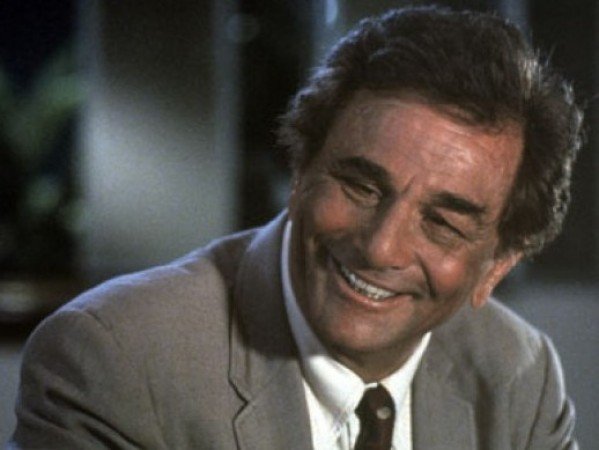This is part two of a two-part post on why, some 45 years later, Columbo still matters. Part one is here. This essay is excerpted from The Columbo Case Files: Season One, found here. Thank you.
*
I now have the entire collection, all 35 years, nearly 70 episodes in all, and I’ve seen each of them at least twice, most of them more than that, and a few favorites nearing 10 times apiece.
For this book, I watched every episode in Season One again, and then again. I must confess — it is after all an essay about the truth and its tendency to will out — that this got harder, as I went. Because in watching closely to write the best guide I could, I had to look at the shows — writing, acting, and even Mr. Falk — differently. Among other differences, I looked more closely. And at a few points I grew weary; there was discomfort and dreariness.
But the tighter angles and heavier analysis also showed me why we watch.
Why we watch at all, and why we keep watching — and why it matters — even if we can’t say why, and don’t need to know to like it more and more each time. The qualities that draw us in, and keep us there, are the ones that bloom, that burrow deep, without our even noticing.
*
It’s because it’s true.
The Columbo we love — and the Columbo we love to watch annoy hell out of the murderers, until some of them beg to be caught and taken away just so the questions will stop — all of it stems from the deep truths of stories — and about human nature itself.
There’s the restoration of order of course, order of many kinds, and there’s the reminder to the rich that the rule of the universe is you get what you need not what you think you deserve and that even money and power and your supposedly foolproof plan cannot protect you, if you kill.
There is how Lt. Columbo solves the crime, which we the eyewitnesses have seen: namely by gamely paying attention and asking questions. Those are deep practices not unrelated to love.
There is also his essential kindness: how even when he’s tracking the killer — even we know he knows and that realization is slowly dawning on the murderer, too … he’s unfailingly … nice.
He is nearly unfailingly good.
Lt. Columbo is — to use words said to be more in demand today than 40 years ago, but that are actually ever-welcome — genuine, authentic, and real. He actually is intrigued (to take an actual example, from Episode 1:2) about what to do when decorative soap sticks together after it’s used.
When he notices stuff it’s not that he’s being annoying, or that he’s weird. These are quirks, odd, whatchamacallit … idiosyncrasies … even to us … but that’s because we’re not that consistently questioning, caring, and kind.
I think he truly is intrigued, curious — even at times in wonder — about such things.
When in every episode, every … single … one … he notices at least a half-dozen details, niggling crummy little curiosities, it’s because he really wants to know. Of course — at times he’s showing the murderer the game is not only afoot, but that it’s almost up.
But he also knows life isn’t like that, or shouldn’t be, and what we just saw just doesn’t fit … and why not?
He knows it should be otherwise, and if it’s not, something’s wrong and needs to be righted.
And of course it’s because the account of life the murderer gives — from who they blame for all their ills, to what they say, to how they leave the crime scene, to how they behave afterward, and the explanations they give for all of this — is utterly false.
*
The reason it works is because it’s true and real and deep. And this is possible because the writers knew — know — Lt. Columbo, and everything about him.
The facts aren’t as important as the truth. There are inconsistencies over the series in the show’s telling of the man: whether he can cook, let’s say, whether he drinks, and even about his beloved missus. But the truth, as ever, lives on well past the facts.
And so does Columbo.
The writers know everything about Lt. Columbo … Peter Falk knew … and now, at any time, we can too.
*
Peter Falk died June 23, 2011. The obituaries began June 24, 2011 — my fifth wedding anniversary.
Still married and still watching, I also confess to liking 1970s episodes the most: the ones I saw as a kid, the ones with all the kitsch. I may simply be too close to episodes from the 1980s and 1990s: too close to the parachute pants and mullets, too close to the techno-music. Maybe an overacting killer embarrasses me when it’s from the years I came of age. The 1970s just seem more like fun.
And Columbo is a joy to watch, no matter what the year.
And that’s why we do.
*
This is part two of a two-part post on why, some 45 years later, Columbo still matters. Part one is here. This essay is excerpted from The Columbo Case Files: Season One, found here and here and here. Thank you.
